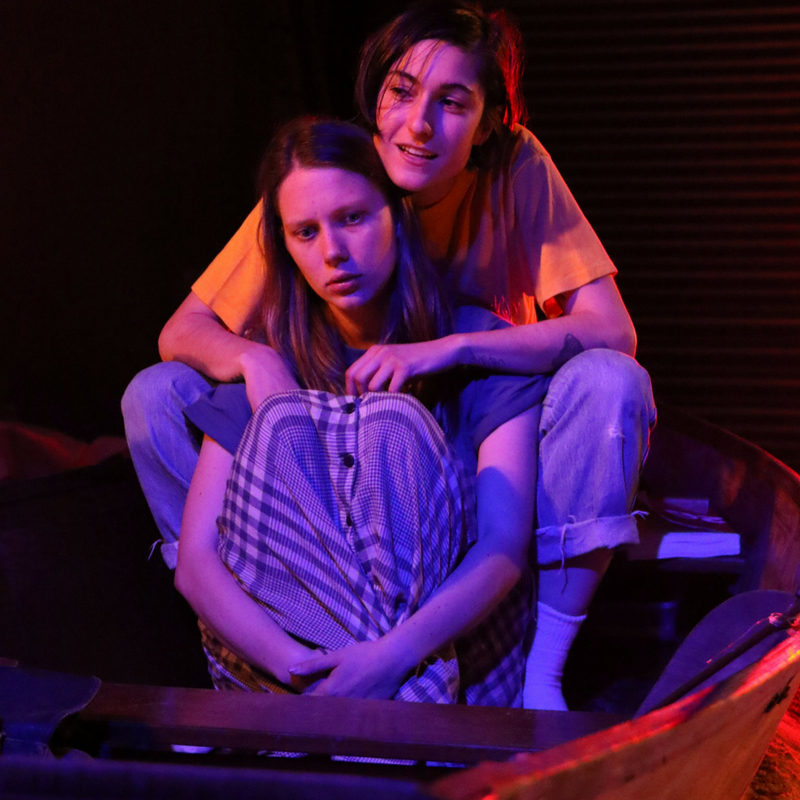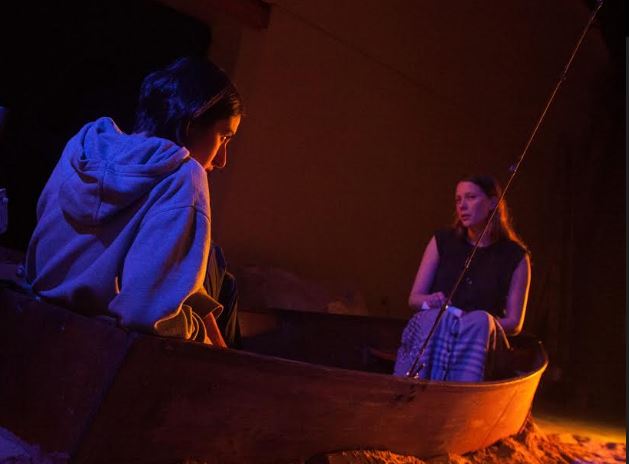
I have a recurring image in my head of two women beating the absolute shit out of each other.
This was in the spring of 2010.
Deepwater Horizon had just blown up, killing 11 crewmen and gushing oil into the Gulf. It was all anyone was talking about.
The Gulf. The Gulf. The Gulf.
I thought to myself, what a great name for a play.
Completely unrelated thoughts had me ruminating over the image of a woman pushing another woman out of a boat and then bludgeoning her to death with an oar. She then collapses in the corner of the boat and says, “Damn, Betty, you wear me out.”
That line remains in The Gulf to this day, six years later. I wanted to know…
Why are they fighting?
And then it came to me.
Love.
It was the only thing I could think of that would cause that level of passion.
But what kind of love? And why the rage?
I started working my way backward.
She’s a cheat? Yeah. Betty is a cheat.
(I gave her a name and a purpose.)
Betty did a bad thing. And now… Kendra? Yeah, I like that name… Kendra has found out about it.
Diana Popovska and Brenna Harding in the Australian premiere of THE GULF by Audrey Cefaly. Directed by Mia Lethbridge.
Journal entry: “How does Betty not drown? Shallow waters? What? Where?”
The Gulf. The Gulf. The Gulf.
Again, this title. It stayed with me. I had no idea what it would be about, I just knew I liked all the possibilities.
And then somehow the title and the image of the two women became one.
Two women. A Boat. THE GULF.
I look up the word “gulf” in the dictionary.
gulf (noun.)
a portion of an ocean or sea partly enclosed by land;
a deep hollow, chasm, or abyss;
any wide separation, as in position, status, education;
something that engulfs or swallows up
Wow. Wow. WOW.
I began thinking about all the ways to exploit every ounce of the word, not the least of which is their fishing location.
But where in the Gulf, exactly? The open ocean? Hmn…
Journal entry: “Call Jeff about fishing locales.”
And then the other definitions – disparate ideals, trajectories, aspirations. Their physical surroundings. The divide. This world that is swallowing them up.
Is there some Gulf oil spill reference I can put in? Something small?
Kendra: Can’t fish in Bottle Creek. That shit got in. choked it.
I start peppering the script here and there with dialogue that conveys a sense of separation, unrest, or distance:
-
“Could we be more different, I wonder?”
-
“You ain’t never gon’ be happy with me.”
-
“I don’t know why I bother.”
-
“That’s not a job, you work at a sewage plant.”
-
“I think maybe you look down on me.”
I walked around a nearby pond at lunchtime. I sat and looked out at the water, searching for clues. I noticed how the water rippled up to the shoreline. I picked the wild blackberries. I took notes.
Maybe she goes overboard but maybe she doesn’t drown, maybe they’re fishing in shallow waters and you can’t drown so easily in shallow waters?
Journal entry: “CALL JEFF.”
May 2010. Phone call to Jeff (a dear old friend from ‘bama): “Tell me about the fish. The bait. The water.”
“They’d be fishing for red. Reds like to fight, but in the flats they get more traction, the fight is more fun,” he said.
Maybe it’s because it’s a fishing story… but I swear to god, with every syllable he uttered, the metaphors just started flying into the boat. I thought:
These women LIKE to fight! They like it rough! They keep returning to the “flats,” the shallow water, they keep returning to each other, it’s a dance, a ritual, again and again, no matter how bad they are for each other, they just can’t stop.
Journal entry: “Jeff says to look into ‘V-bottom boats…Stauter-built’ and don’t worry about the bait: ‘If the fish ain’t bitin’ it ain’t cause of the bait… it’s cause they ain’t there.’”
Later that evening. Facebook post: “Sometimes I miss Alabama so… so much.”
June 2010. Email to daddy (my #1 fishing buddy): “Hi, Daddy. I am working on my new play… “
Reply from daddy: “I have not fished the Tensaw delta since I was a kid so I recall little about it. It is a vast tract of swampy trackless wilderness. Most of the boats I recall were handmade wooden skiffs with flat bottoms and in the range of 14 to 16 feet. In terms of the spill… I am on the list to do cleanup work of any kind but, the powers that be now say ‘don’t call us,….’ So much for maximizing resources. As said, ‘it get worser worser’.”
Later that night. Research: I was watching videos about fishing in the Tensaw. An image of some people standing around a gutted catfish and its heart was flopping all over the boat.
WHAT?????!!!
I was stunned. I couldn’t move. I kept playing the video over and over and over. My heart was pounding.
Holy shit. That’s Kendra and Betty! The damn heart is out of the fish and it’s still beating?!? Why? Why does it do that? Human nature? No… habit.
This. This was a revelation. I began weaving in Betty’s squeamishness over a fish she saw Kendra gutting the week prior. A catfish. Her refrain:
Betty: “Why does it do that, Kendra, why does it keep beatin’ like that?”
And now, the thematic weight of the whole piece felt strong and solid. The idea that we keep returning to one another even when it’s painful. Because it’s all we know how to do.
Days went by. The tinkering phase. I share it with my collaborator. I think about Kendra and Betty, the lovers, and I notice something missing. There was a lot of anger, but not a lot of love.
Margin note: “Where is the love?”
I thought about ways to convey the good things. The reasons they stay together.
Maybe Betty reaches for Kendra. Or maybe Kendra reaches for Betty?
An image pops into my head: Kendra has pulled out a knife to cut her fishing line. She lays the knife on the bench and Betty picks it up. Kendra looks up, wildly aroused at the sight of Betty caressing the blade.
Kendra: You gon cut me open?
Betty: I was thinkin’ about it.
Kendra: Do it.
Betty: I will.
Kendra: I want it to hurt.
Betty: Oh, it’s gonna.
It’s then I realized that the only time Kendra responds to Betty’s advances is when she’s holding a knife.
WHAT?
Again: the metaphors.
They “like” the danger? They get off on it??? Foreplay, maybe?
At the
time of the writing of the above exchange, I had already written the fight scene. So the knife moment, which comes near the beginning of the play, was as ominous as it was sexy. In the end, of course, once Betty’s infidelities are exposed, Kendra gets cut wide open, gutted. In later versions of the play, I added in Kendra’s take on the virtues of the simple life. Again, the irony of her speech, given that she’s the one who gets hurt in the end, is staggering:
Kendra: We came to fish, Betty, but you never fish. And you don’t want to learn, either, you just want to sit there with your books and your papers and whatnot and rearrange my life to make it fit yours in some magical futuristic happy place that exists, where? I don’t know, in your mind, maybe? Meanwhile, I’m doin’ it. I’m takin’ part in the miraculousness of life, Betty. REAL LIFE. Where folks catch fish, rip their FUCKING guts out and then eat ’em. And they don’t think twice about it and you wanna know why? Cuz it’s just FISHIN!
July 2010. Facebook post: “Every time I bring a new play into this world, I have to remind myself that the last one… imperfect. hesitant, reluctant to breathe… even my best work… was once in disarray. But this is the beauty of theater, the collaborative art: as long as I’m paying attention – listening – quite often, the play will write itself.”
August 2010: The Gulf (one-act) has its world premiere at Silver Spring Stage.
July 2015: The Gulf (one-act) wins the Samuel French Off Off Broadway Short Play Festival.
August 2016: The Gulf (full-length adaptation) is the recipient of The Edgerton New American Play Award.
September 2016: The Gulf (full-length adaptation) has its world premiere at Signature Theatre, Arlington, VA.
January 2017: The Gulf (full-length adaptation) is nominated for the Charles McArthur Award for Best New Play.
The play has evolved significantly in six years. Yet with all of the revisions and the many pages added the overall structure has stayed the same. In the longer version, Betty riffs on cats and the boat breaks down and they are stuck out on the water.
Always, I focused on the love between them and the universality of aching hearts. And also on the idea that though they are a same sex couple, the play really isn’t at all about being gay. Because after all, I didn’t start out to write a “lesbian” play. I started out wanting to know why the two women in my head were fighting so brutally. And the answer is really simple. They want what we all want. To find peace. Two lost and lonely people, six years into a volatile, troubled love affair, and then one night, it breaks. Badly. I felt it was vital that the plot not be the twists and turns brought on by outside incursions but the runaway mine train of their dying relationship.
The two questions I ask of all of my characters are…
-
How did you get so stuck?
-
What is the full cost of leaving?
In nearly all relationships, there are ups and downs, obviously. But people don’t always talk about the longing. In playwriting, it is especially critical that we expose the internal drivers that make our characters relatable. Exposition can’t do this. Words alone can’t do this. Audiences want to fall in love. But people don’t fall in love with plot. They fall in love with people.
Our time as humans on this planet, if we want anything other than a life of complete solitude, always involves learning the hard work of love. We let go of our ideals to find some semblance of sanity. We convince ourselves that we can get by with less. And that our own happiness is secondary to the task at hand. It is a great paradox. When we love fully, we lose a part of ourselves. The Gulf leaves us wanting for Kendra and Betty what we want in our own lives. To find a way forward. To be understood. To “win.” So, perhaps Betty will find her freedom. And perhaps Kendra will find her moment of peace. Together or apart. They keep trying and the heart keeps beating.
To purchase a copy of The Gulf click here, and to learn more about licensing a production, click here.

Comedy Mysteries: Gasps, Laughs and Thrills

A Children’s Theatre Classic: An Interview with Snow White And The Seven Dwarfs Composer Michael Valenti


